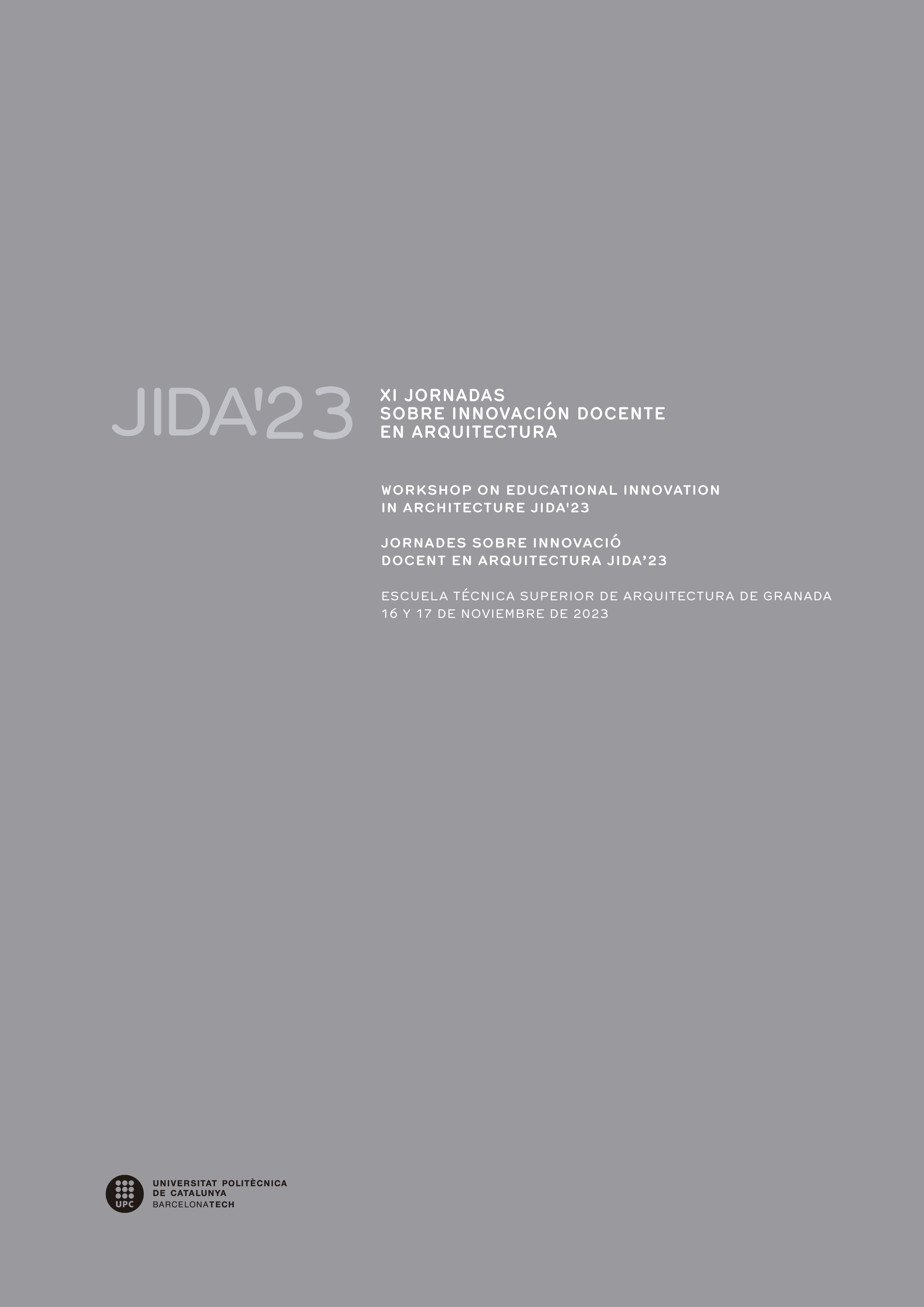Learning from experience: The role of prior knowledge in the initial training of architects
DOI:
https://doi.org/10.5821/jida.2023.12357Keywords:
prior knowledge, significant learning, tacit knowledge, project didactics, architecture teachingAbstract
In architectural education, transitioning from academia to the professional world can often lead to formal standardization, diminishing autonomy and originality in design tasks. To tackle this challenge, a pedagogical approach is proposed in the first year of the program, bridging students' prior knowledge with new insights. Through exercises employing natural materials, students are immersed in design experiences reminiscent of their early childhood years. This aims to stimulate creativity and alleviate the initial pressure of spatial configuration. Qualitative analysis tested the pedagogy, confirming the role of prior knowledge in their initial academic design endeavors. It bolstered confidence in their decisions and facilitated an intuitive grasp of structural and constructive criteria, thereby reinforcing autonomy and originality.
References
AMANN Y ALCOCER, Atxu. 2016. “Innovación En El Aprendizaje Arquitectónico de Lo Inútil, Especulacciones: Taller de Acciones Ligadas al Proyectar.” En IV Jornadas Sobre Innovación Docente En Arquitectura (JIDA’16), Escuela Técnica Superior de Arquitectura de Valencia, 20 y 21 de Octubre de 2016, 42–52. València: Grup per a la Innovació i la Logística Docent en l’Arquitectura (GILDA). <https://doi.org/10.5821/jida.2016.5096> [Consulta: 15 de septiembre de 2023].
ARESTA, Marco. 2020. Arquitecturas biológicas. El amor por la forma (philomorphus). Bogotá: Ediciones de la U.
AUSUBEL, David. 1983. “Teoría del aprendizaje significativo” en Fascículos de CEIF.
BRAUN, Virginia, y CLARKE, Victoria. 2006. “Using thematic analysis in psychology” en Qualitative Research in Psychology 3 (2): 77-101. <https://doi.org/10.1191/1478088706qp063oa> [Consulta: 15 de septiembre de 2023].
CHELLE, Ricardo. 2018. «Concepciones, conocimientos previos y prácticas en la enseñanza de diseño: un lugar de controversias» en Cuadernos de Investigación Educativa, vol. 2, núm. 17, p. 7-25. <https://doi.org/10.18861/cied.2010.2.17.2714> [Consulta: 15 de septiembre de 2023].
MARTIN-ROMERA, Ana, y MOLINA RUIZ, Enriqueta. 2017. “Valor del conocimiento pedagógico para la docencia en Educación Secundaria: diseño y validación de un cuestionario” en Estudios pedagógicos (Valdivia), vol 43, núm. 2, p. 195-220. <https://doi.org/10.4067/S0718-07052017000200011> [Consulta: 15 de septiembre de 2023].
MOREIRA, Marco Antonio. 2005. “Aprendizaje significativo crítico 1 (Critical meaningful learning)” en Bol. Estud. Invest, núm. 6, p. 83-101.
PALLASMAA, Juhani. 2014. La mano que piensa: sabiduría existencial y corporal en la arquitectura. Barcelona, España: Gustavo Gili.
PALLASMAA, Juhani. 2016. Habitar. Barcelona: Gustavo Gili.
SENTIERI OMARREMENTERIA, Carla, y NAVARRO BOSCH, Ana. 2017. “El aprendizaje de la arquitectura a través del juego”. En V Jornadas sobre Innovación Docente en Arquitectura (JIDA’17), Escuela Técnica Superior de Arquitectura de Sevilla, 16 y 17 de Noviembre de 2017: libro de actas, 363-79. Barcelona: Grup per a la Innovació i la Logística Docent en l’Arquitectura (GILDA). <https://doi.org/10.5821/jida.2017.5243> [Consulta: 15 de septiembre de 2023].
VERBREE, Anne-Roos; ISIK, Ulviye; JANSSEN, Jeroen; y DILAVER, Gönül. 2023. “Inclusion and diversity within medical education: a focus group study of students’ experiences” en BMC Medical Education, vol 23, núm. 1, p. 61. <https://doi.org/10.1186/s12909-023-04036-3> [Consulta: 15 de septiembre de 2023].
ZUMTHOR, Peter. 2010. Pensar la arquitectura. 2.a ed. Barcelona: Gustavo Gili.






















